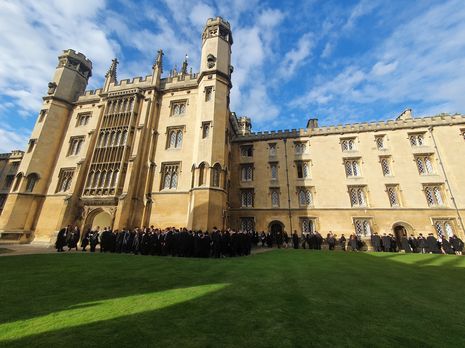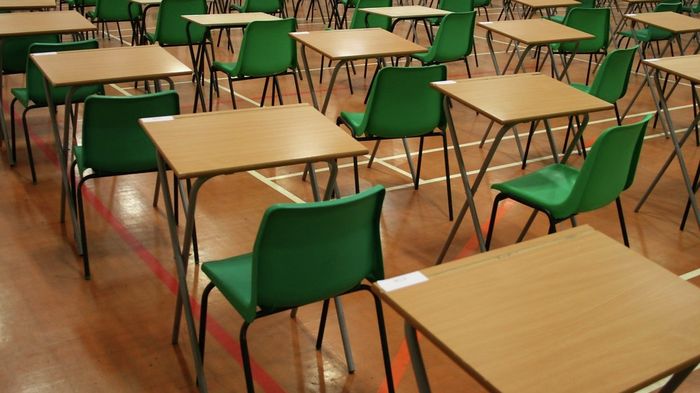Scrapping state school targets is playing a dangerous game
The removal of school type in future access plans needs to be executed carefully, argues Matthew Taylor

In 2022, Trinity College piloted a grant providing Cambridge Bursary students with an additional annual sum of over £4000. In an unprecedented move of intercollegiate support, this scheme was extended to students who had originally applied to Trinity, but through various pooling mechanisms had found themselves at another college. Unfortunately, the acceptance rate of state-educated UK students who originally applied to Trinity in 2022 (even if this was not where they ended up) was 20%, compared to 31.1% from independent schools. No such discrepancy exists at a university-wide level but it does persist across admissions cycles at Trinity.
What this suggests is that the process of applying through Trinity is biased against state-educated students (no doubt more likely to qualify for the Cambridge Bursary). It is plausible then that a student whose college choice is influenced by the prospect of an additional £4000 might be rejected when they may have otherwise been successful if they had just applied directly to Lucy Cavendish (not that they could afford it). This is just one example of a policy that seems to increase accessibility, but doesn’t appear particularly well thought out.
Let’s discuss something else that seems positive. There are a number of reasons why admissions targets around school type should be scrapped as is intended in the next Access and Participation Plan. First and foremost, the category of a state school has never been particularly useful. The amalgamation of state comprehensives and grammar schools for the purpose of reviewing the accessibility of higher education is laughable – it is no secret that the cultures of these school types are often (though not always) drastically different. The selectivity of grammar schools, for example, fosters an environment where academic attainment is widely understood to be important from the outset of year 7. I shall leave it there, preferring not to open the socioeconomic can of worms that comes with the coachability of the 11-plus.
"The category of a state school has never been particularly useful"
Beyond the grammar school problem, there is also a large variation in the quality of education at state comprehensives. The proponents of school-type scrapping will therefore say that this metric undermines other, better factors in assessing access to higher education. The Office for Students is now encouraging universities to look at ‘individual level socioeconomic circumstances’ such as postcode specific indices of multiple deprivation (IMD) when formulating their access plans.
Despite these arguments, I remain sceptical of the efficacy of such a change. A quick browse of an IMD dataset tells me that someone I know of who went to a boarding school with fees in excess of £16,000 a term is considered to live in an area sufficiently deprived for their hypothetical admittance to Cambridge to be considered widening participation. Clearly, individual-level data is not foolproof either. It is curious to me that there is not more drive to combine generalised and specific data to construct the best picture of applicants at a university that so commonly throws around the term holistic with regards to its admissions process.
If you are not yet convinced of the importance of state school targets, perhaps clinging onto the fact that at a university-wide level, the acceptance rates of state-educated and private-school students are roughly equal. I must ask you to consider how this can be at a university that has a state-educated intake of 70%. In no way is the educational background of the UK reflected in this figure. Yes, acceptance rates are equal, and yes, that is a great step, but it is only so because not enough state-educated students are applying. Whether this is due to a widespread lack of ambition, or an aversion to the perceived stuffiness of Oxbridge, our aim should surely be to remedy this situation.
Should these barriers be removed, it is reasonable to think that these additional state-educated individuals would make a marginally less competitive application (though by no means not worthy of admittance), than their peers who have been applying in spite of them anyway. This is of course a gross simplification of the psychology of applying to Oxbridge, but one that from my experience has at least a modicum of truth behind it. In the unlikely event that this disparity in attitudes can be fixed, the cultural and social capital that tends to come with a private education, predisposing a student to excelling at interview, would render state school targets more necessary than ever.
The reality is we have a lot to thank school type targets for. They are behind the extensive outreach operations we see at secondary schools encouraging students who are not otherwise being told to, to aim high. But also, they have proven their own importance by allowing us to see that a state-educated student will, on average, perform better than their privately-educated peers with the same grade profile at A-level.
"We have a lot to thank school type targets for"
While it is true they aren’t perfect, shouldn't we give these targets a proper chance by being a bit more specific with how we define a state school for access and participation purposes, and combine this information with new specific metrics? Apparently not. It is a consolation that school type will still be considered in applications, but I worry that without a formal procedure for doing so, we risk being passive in getting a diverse intake of students into these tired institutions. Adjustments to admissions targets should reflect how access to education in our society is changing. Only time will tell if this move is doing that, or if it is simply a strategy to assuage the fears of Eugenie’s or Cordelia’s mum and dad that having paid some half a million pounds for their daughter’s education, she will not be discriminated against when it comes to applying to Cambridge.
 News / Colleges charge different rents for the same Castle Street accommodation2 March 2026
News / Colleges charge different rents for the same Castle Street accommodation2 March 2026 News / News in Brief: waterworks, wine woes, and workplace wins 1 March 2026
News / News in Brief: waterworks, wine woes, and workplace wins 1 March 2026 News / Climate activists protest for ‘ethical careers policy’1 March 2026
News / Climate activists protest for ‘ethical careers policy’1 March 2026 News / Angela Merkel among Cambridge honorary degree nominees27 February 2026
News / Angela Merkel among Cambridge honorary degree nominees27 February 2026 News / Private school teacher who lied about Cambridge degree barred from teaching27 February 2026
News / Private school teacher who lied about Cambridge degree barred from teaching27 February 2026









